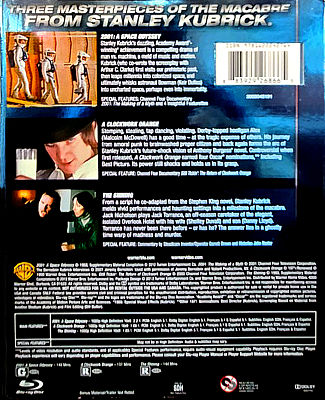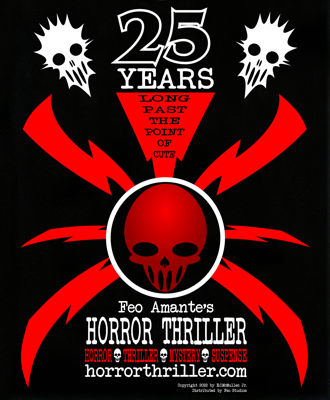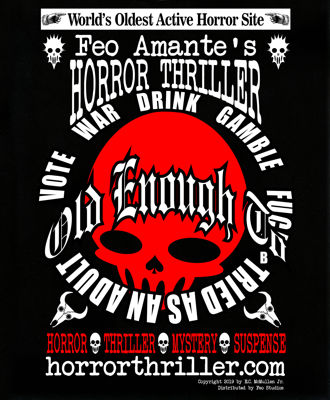 |
 |
Review by E.C. McMullen Jr. |
|
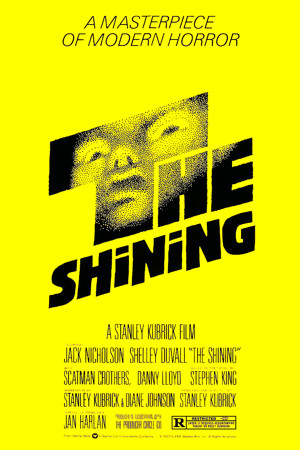
THE SHINING- 1980USA Release: May 23, 1980 (146 min.) Pulled 1st Kubrick Cut Re-Edit Release: June 13, 1980 (144 min.) Pulled 2nd and final theatrical Kubrick Cut Re-Edit Release: June 20, 1980 (119 min.) Hawk Films, Peregrine, Producers Circle, Warner Bros. Rated: USA: R |
|||
Based on the Stephen King novel, I feel better calling this Stanley Kubrick's THE SHINING.
This is why.
THE SHINING opens with a mountain lake, an overhead shot of a an old yellow volkswagon bug, on a winding road snaked through forest and mountains.
Cyan colored credits scroll up as the dour electronic music of Walter Carlos (Now Wendy Carlos: TRON) plaintively howls and moans.
This gives a full sense of how remote a place the little car is traveling toward.
It is beautiful, intriguing: I saw this on opening day and was fully immersed before Jack Torrance (Jack Nicholson: THE LITTLE SHOP OF HORRORS [1960], THE RAVEN [1963], THE TERROR, TOMMY, THE WITCHES OF EASTWICK, BATMAN [1989], WOLF, MARS ATTACKS!) entered the motel and announced his arrival to meet with Mister Ullman (Barry Nelson: EYES IN THE NIGHT, ISLAND CLAWS).
Meanwhile, in a bleak, utilitarian apartment complex in Denver, Colorado, a Mother and child have lunch. The child, Danny (Danny Lloyd), watches Looney Tunes on TV while his pale and sickly appearing Mother, Wendy (Shelley Duvall: TIME BANDITS, THE UNDERNEATH, SHADOW ZONE: THE TEACHER ATE MY HOMEWORK, THE 4TH FLOOR, BOLTNECK), reads.
Danny has misgivings about Dad's potential new job and it is here we first find out about his "imaginary" friend, Tony.
Back at the hotel, Jack is ace'ing his interview and Mr. Ullman, the hotel manager, is impressed. His second in command, the silent Bill Watson (Barry Dennen: MAD HOUSE, SHOCK TREATMENT, THE DARK CRYSTAL, LIQUID DREAMS, GRIM FANDANGO [VG]), is noticeably less impressed.
Ullman explains the hotel, the environment, the day to day details, describing nothing but what seems to be a hellish job. One that not only carries enormous risks, but has already driven people to murderous insanity.
Jack takes all dire warnings in stride. He really needs this job and thinks he and his family can tough it out together. Besides, Jack has dreams of becoming a published writer and thinks solitude is just the cure to help him focus on his future.
Back in Denver, Danny is alone and talking to Tony, who shows him horrific visions. When he wakes he's being inspected by a doctor (Anne Jackson: THE BELL JAR).
The doctor assures Wendy that Danny will be all right, but is curious about his imaginary friend Tony. Wendy explains how Tony first appeared and the doctor is silenced by the knowledge.
Then it's off on a road trip and a long, happy, 3 plus hour drive to the Overlook Hotel.
How happy? They have a family conversation about the Donner party.
At the hotel they all meet with Mr. Ullman and the still silent Bill, whose purpose as a character seems to be giving Jack the stink-eye.
Ullman brings Wendy up to speed on all the happy highlights of the hotel - minus the gruesome slaughters - and she falls in love with the place - she says.
We're introduced to Mr. Hallorann (Scatman Crothers: DEADLY EYES, THE TRANSFORMERS: THE MOVIE [1986]), the head cook who runs the kitchen.
We soon find that Mr. Hallorann has a special gift: A Psychic power of seeing the past and future as well as reading minds.
He knows that Danny has the same gift, what Hallorann calls Shining.
At a moment when Danny and Mr. Hallorann are alone, the older man gives the child some advice.
By 5:00pm, the Torrances are the only living people left in the hotel.
ONE MONTH
Wendy and Danny are making the best of the situation but Jack is beginning to fray. Wendy tries her best to keep Jack's spirits up, but her sunny disposition only gnaws on Jack. There is little love left between them and Wendy and Jack only run on fumes. As Wendy tries to stay positive about their life at the hotel, Jack unloads his frustrations out on her whenever the opportunity presents itself.
Wendy's happiest moments are playing with Danny and the two enjoy the hotel's giant garden maze among other things.
Jack however, becomes increasingly frustrated at his inability to come up with a story.
"I've lots of ideas. No good ones."
Jack is a recovering alcoholic barely able to keep his demons at bay. His tone and attitude with Wendy and Danny is sharp and threatening even when he attempts to be pleasant. When the brutal winter sets in, keeping them all inside, Jack finally succumbs.
There were plenty of solid actors in 1979 who could have played the role of a man's descent into madness. For whatever reason, many reasons, Kubrick wound up with Jack Nicholson: an actor who by that time (and ever since) played nearly nothing but villains and madmen, even in comedies.
I never bought into Jack's descent into madness. That madness, along with cruelty and a murder streak, are all surface inevitable, which severely wounds the movie.
Ironically, at the same time, it is Jack Nicholson's performance, while he was literally mocking the material (Stanley's ever-changing script), that saved THE SHINING from complete box office disaster.
The script changed on an almost daily basis (sometimes changing from morning to noon), so Jack-the-actor gave up trying to prepare ahead of time and often ad-libbed whenever he felt like it, just for a gag. Jack becomes the joker.
No where does this much needed humor come into greater play than in the ballroom scenes with Jack falling off the wagon by drinking alcoholic beverages that cannot possibly be there.
It's here that Nicholson played off of the iciest straight man ever committed to celluloid: the memorable scene stealing bartender, Lloyd (Joe Turkel: TORMENTED, VILLAGE OF THE GIANTS, BLADE RUNNER) who, in combination with perfect light direction (Kubrick's GoTo Cinematographer / Photographer, John Alcott), delivered a measured, heart-stopping performance of quietly cold, smiling malevolence.
In fact, it's Nicholson's comedic mocking of Kubrick, while in character, that became the face of THE SHINING when it went into home video and re-release. Jack's grinning face through a hacked door and the moment he delivers a line that was relevant to his era (now undecipherable and unfunny to modern audiences) and became the bonkers poster for the movie.
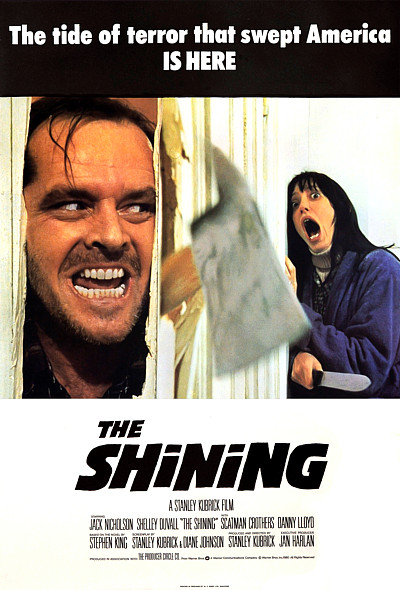
Stanley Kubrick had no idea where he was going with THE SHINING.
We know this because throughout the shoot of the narrative, his daughter Vivian shot her documentary, THE MAKING OF THE SHINING. This was shot as a television promotion for the movie and would eventually become a disc extra. In Vivian's meta movie of her Father's movie, Stanley was throwing everything against the wall, hoping something would stick. He angrily took his personal frustrations out on the crew and particularly Shelley Duvall, who after more than three months of Kubrick's humiliating battery in front of everyone, became a mental wreck who has yet to recover, 40 years later.
Stanley knew how to do still photography: he knew lighting and cinematography. He knew how to get the best out of his Production Designers (Roy Walker) and he had an ear for sound effects, up to a point. But as well-versed as he was with drama - and that's what THE SHINING wound up being - he was lost on comedy and scary movies.
TRIVIA: MGM, then later Warner Bros., have advertised it as such for decades. In fact, the latest Blu-Ray release 3 pack - 2001: A SPACE ODYSSEY, A CLOCKWORK ORANGE, and THE SHINING are described on the case as "Three Masterpieces of the Macabre from Stanley Kubrick."
2 A performance I didn't appreciate upon first viewing, because I'd been hammered over the head by the first hour of Kubrick's seemingly endless "Wendy is Damaged and Ready To Crack" from her intro, and "Jack is Evil and Ready To Explode" from his intro. Look at Me-style Cinematography, over-Exposition dialog, Over-Explanation monologue, all of the walking, more driving (Magic Car, Snow Cat, and Big Wheel), and in the final act, Jack Nicholson's bravura "Oh, F-You, Stanley!" scene-chewing that ripped to shreds the "Wait! What?" 2001 ending to the whole farce that Kubrick apparently wanted. In her last interview, Shelley walked back most of her earlier negative descriptions of working with Kubrick. Facing death, she made peace with the centerpiece of her acting legacy. 3 There's an exception to nearly everything and the exception here are two actors, 4 Movies are often made with two or more investors or investor groups (THE SHINING had four). They aren't all paying for the same full movie. They are brought in to fund development, preproduction, or production, post production, advertising. They may pay only for the production when it's shot in a specific country, or state, city, or set, or scene. They put their money in and they want a return. More than that, they sometimes demand to see what they paid for On The Screen and not have their investment end up on the cutting room floor. When investment doesn't make the final cut, if it never gets a showing, it makes it much harder to defend their share of the profits down the road against those who can claim their investment is what selling the movie. Eye On Design The Hollywood Reporter - The Old School Animation Technique that Makes 'The Shining' So Scary |
Ironic again because Kubrick delivered the scares in 2001: A SPACE ODYSSEY where the movie's final third was the decisively sinister computer, Hal.
Falling back on his own tropes instead of creativity, Kubrick's orchestrating of the final act of 2001, replayed out in THE SHINING with Hal becoming the obedient yet chillingly malignant Lloyd and Mr. Grady ("If, I may be so bold." "If, you don't mind my saying so, sir."), both encouraging and impugning Jack. The walk-in freezer scene alone, with Mr. Grady as nothing more than a voice taunting Jack, is a beat by beat replay of Hal and the airlock scene in 2001. Further, the 2001 Final Act sound effects (after Hal is gone from the story) of something echoing, muffled in the background, as if living within the walls or just behind them, are also grafted into THE SHINING.
2001 the Science Fiction drama
becomes a Science Fiction Horror movie 1, possibly because the story was kept in a tightly disciplined place by co-writer Arthur C. Clarke, who would brook no unscientific nonsense even while he permitted Kubrick's SFX artists (Douglas Trumball and others) their flights of fancy.
When listening to Stephen King tell it, it appears that Stanley tried to get that same disciplined guidance or mentorship from King that he got with Clarke.
Stephen, who speaks of his odd phone calls from Stanley in the night, still seems unaware of that however. Further, King is on solid ground regarding the supernatural but is out to sea on science and often writes about his distrust of it in general. King finds comfort in religious superstition: he believes in things like Heaven and Hell where Kubrick did not.
Stanley couldn't even fake it.
So the final act of THE SHINING becomes something of a combination Roger Corman hack/slash and Gothic skeleton scare movie (where Nicholson got his start). Yet because they were so common by 1980, no one was scared while watching it. The only reason we know it's scary at all is because of Shelley Duvall's masterful performance as the terrified Wendy 2.
After years of watching old videos or reading old interviews of the late Kubrick talk about his art and what ticked for him when making movies, I've come to the conclusion that he felt indifferent to most people; they confounded him and for that reason he didn't know or like humanity in general, and never knew or cared to be a part of them.
Strange then, that Kubrick chose a profession that relies on our approval.
IF (<-- that's a big if)
my conclusion is correct, this also may explain why Stanley didn't know how to direct his actors in any humanly compelling way that would not make them come off as robots. Kubrick knew when his actors were doing something wrong: He could fixate on that. He just never knew what looked right.
Which was why he was the man of a thousand takes, so to speak, so that no actor ever wanted to work with him again. They would praise him, of course: glad to be part of his story. But no. Hell no. No need to go through that again. 3
Kubrick, who learned to like many of his actors, was seemingly aware of this fault. This could explain why, from the very start, he chose to bully Duvall to get the performance out of her that he was unable to communicate. It doesn't rule out the fact that he acted like an abusive thug or forgive his behavior.
To get what he wanted out of Jack, Kubrick had the craft services staff offer Nicholson only cheese sandwiches - which Jack hated.
Scenes of Jack Nicholson angrily throwing a tennis ball against the wall was all the actor's idea, as he loosed his frustrations in working on a Kubrick film with a director who could never figure out what he wanted On A Daily Basis.
For the actor, Danny Lloyd, this was his first and last picture. After working with Kubrick, he decided acting was not for him and he grew up to become a scientist. This despite Kubrick being "highly protective" of Danny on the set (to my knowledge, no one ever explained who or what the doting Kubrick thought he was protecting Danny from).
Scatman Crothers, exasperated and exhausted at having to do a single short take over 70 times, finally flat out asked, "Just what do you want, Mr. Kubrick?". Crothers request was sincere, not critical, and Kubrick was so surprised and ashamed at the question that he snapped out of his "Do it again!" fugue and stopped.
As long as I'm writing about Scatman Crothers, there's something else Stanley Kubrick did that you won't find in Stephen King's novel and that's...
!!!THE UNFAIR RACIAL CLICHE ALERT!!!
In fact, it is because of this movie that I dedicated the UNFAIR RACIAL CLICHE ALERT (URCA) to Scatman Crothers.
If you don't know what I'm talking about, first go to the URCA. Then go to URCA/TheShining to see why it got one.
Stanley Kubrick's THE SHINING, as many have said before me, is visually lush and beautiful - but it's barely scary.
Stephen King's THE SHINING, which I read back in the 1980s after seeing the movie, sent chills through me. In my mind, actor Shelley Duvall stayed as the wife and Jack Nicholson faded before I reached mid-novel. To this day King's world sits on book shelves, ripe for remake or re-interpretation if you will.
The cut you see in North America is not the one Stanley wanted.
Stanley made demands, bloating his budget to add scenes, spent beyond the bloated budget while spending entire weeks re-shooting a scene that only lasts for seconds, and then in the editing room, not wanting it at all. He simply threw up his hands in resignation, signed off on letting the studio and editors do what they wanted, and flew off to England to work on his next movie.
Which is why THE SHINING wound up getting three major releases in 1980. The WB Released, pulled, re-edited, released, pulled, re-edited, and final release.
Warner Bros. angered suits demanded that Kubrick return and make sense out of his tons of film stock. Stanley eventually edited THE SHINING down to 119 minutes - The European version - and was happiest with that. This shortest runtime is his Director's cut and that's what became the hit in the U.S. and Europe.
As of this writing (Hell, I've patiently waited over 20 years to write this review!), we STILL don't have the Kubrick Cut in the U.S. on Home Video: We only see the WB edit. After Stanley satisfied WB with his final re-edit, Warner decided they wanted many of the scenes they or their investors paid for4, right back in there, and that became the U.S. TV and Home video release. That's what we have in America, the 144 minute cut Stanley didn't want.
That said, Stanley controlled the whole show during production and if he's to be lionized for it, then he should be blamed for it as well.
Three barely earned Shriek Girls for Stanley Kubrick's oft-mocked, THE SHINING.



This review copyright 2019 E.C.McMullen Jr.

|
| DRESS NICE | |
| YOU MIGHT ALSO ENJOY | |||
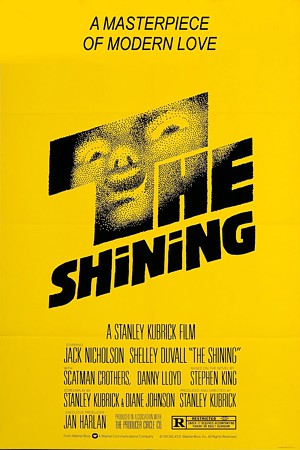 |
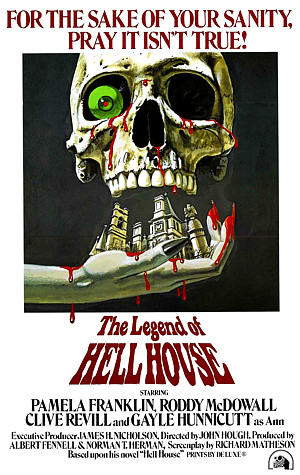 |
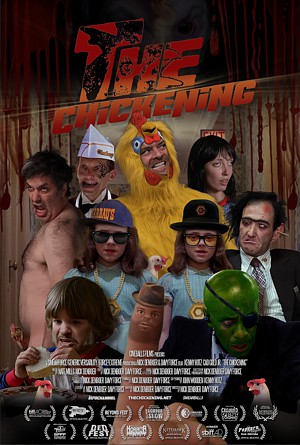 |
|
| SHINING The Robert Ryang Trailer Cut STREAMING SHORT MOVIE |
LEGEND OF HELL HOUSE MOVIE REVIEW |
THE CHICKENING STREAMING SHORT MOVIE |
|
FEO AMANTE'S HORROR THRILLERCreated by:E.C.McMullen Jr. FOLLOW ME @ |
| Amazon |
| ECMJr |
| Feo Blog |
| IMDb |
| Stage32 |
| X |
| YouTube |
| Zazzle Shop |
